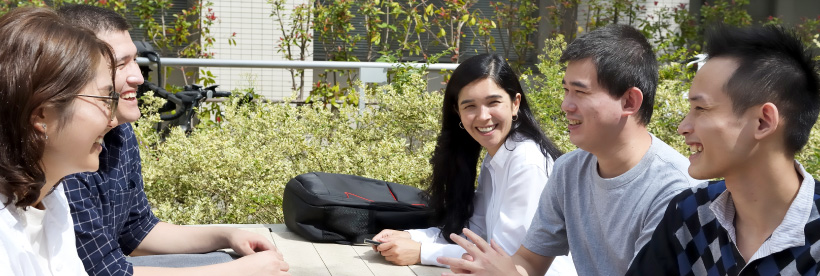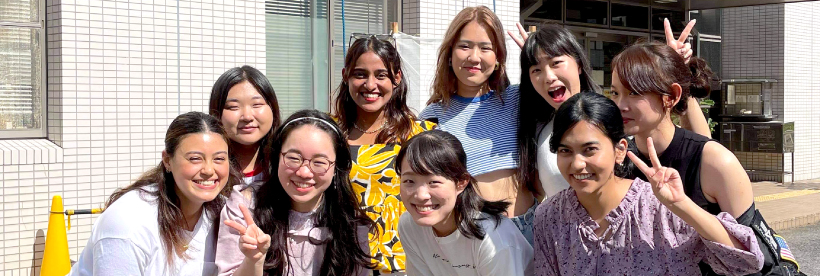
This program, which includes English-taught classes and Japanese-taught classes, aims to further the education of overseas legal professionals, policymakers, civil servants, and legal educators. Coming mainly from Asian countries, graduates from this program are expected in the future to contribute their services to their home country. Successful students are granted the degree of Master of Laws (Comparative Law).
Our Graduate School opened the English-taught LL.M. (Comparative Law) Program in 1999. The program is two years in length. The curriculum requires both taking credits from the subjects and the preparation of a thesis.
This program commenced in October of 2007, in cooperation with the Nagoya University Research and the Education Center for Japanese Law established in the four partner institutions in Asia. The program is two years in length, and the curriculum parallels that of the English-taught stream, requiring both the preparation of the completion of coursework and a thesis.
Initially established for the further education of legal and corporate professionals, this Japanese-taught two-year degree program is open to overseas as well as home students.
The Japanese-taught degree program comprises the first stage of study in the faculty’s longest-standing Doctoral Program in Law and Political Science. The program primarily targets those who intend to pursue an academic career in Japan.
Students are required to enroll in one of the master’s programs for at least two years, earn thirty academic credits or more, write a master’s thesis under the supervision of her/his supervisor and pass an oral defense.
Students select a topic of interest in an area of law or political science and then research an independent basis under the supervision of their principal supervisor.

The Program with English as the primary medium of research and instruction targets overseas students, mainly from Asian countries, who completed a master’s program and demonstrated ability in the academic and practical study of law or politics. Writing a dissertation is the core part of the program. It is expected to contribute to the resolution of theoretical and practical issues of each country, shifting to a market-oriented model.
This program is primarily designed for those working as experts in the administrative, political, legal, or business world while studying toward the degree. Admission to this program is independent of and does not follow from the LL.M. (Modern Law) Program.
It continues from the LL.M. researcher program, which is suitable for the applicants with native-level Japanese ability who wish to pursue academic careers. Upon successful completion of a master’s thesis in the LL.M. researcher program and after passing the special entrance examination for non-Japanese students, an overseas student in this program may proceed to the final stage of study toward the LL.D. degree.
Students who have enrolled in one of the doctoral programs, researched for three years or more under the supervision of 3 academic advisors (supervisor and 2 subadvisors), submitted an acceptable dissertation, and passed an oral defense.
Students should conduct their doctoral research independently under the supervision of their advisors, in close coordination with the schedule for academic writing.
At the end of their first and the second year, they must make a mid-term presentation once a year. During the third year, a doctoral candidate is expected to make a public oral presentation, submit the final draft of the dissertation to the faculty committee with permission from the supervisor. Based on the judgment of the preliminary examination committee, the Graduate School of Law Council makes a final decision as to whether to award the doctoral degree.
Here is the recent dissertation of our alumni.

The School of Law pursues the following educational objectives;
As modern society grows ever more complex and the values that underpin it continue to evolve, a wide range of problems have emerged that have proven difficult to resolve. Against this backdrop, students at the School of Law are expected to develop the knowledge base and abilities described in these educational objectives.
The Global 30 (G30) International Social Sciences Program, offered from October 2011, includes the fundamental disciplines of political science, law, economics, business administration, and information science. Students are
expected to acquire analytical skills, critical thinking skills, and high ethical awareness, such as are needed for the pursuit of knowledge across disciplines. The curriculum in this G30 International Social Sciences Program covers comparative studies of Asian societies, corporate theory, international negotiation, international law, development economics, economic integration, global
management as well as environmental issues. In addition to knowledge in a global context, the program emphasizes the study of the political, legal, and economic systems of modern Japan. Upon selecting their major, students can receive specific guidance from professors in their chosen discipline and are expected to research their graduation thesis under the supervision of their school’s professors.
Check the website of G30
The CAMPUS Asia program is an international joint education program developed to train future jurists,
researchers, public servants and businesspersons capable of engaging in professional activities throughout the
Asian region. Originally a trilateral endeavor between China、Japan, and Korea towards the formation of an East
Asian jus commune (common law), the program has begun expanding beyond East Asia to include the ASEAN
region. This program collaborates with partner universities in China, Korea, and Singapore through exchange
programs for undergraduate students based on reciprocal conferment of academic credits, as well as other forms
of exchange of quality-assured research and education. The program is part of the regular curriculum of School of
Law, and credits earned during participation in the program are applied towards earning a Bachelor of Law upon
graduation. Participating students who have completed the required courses and fulfilled the other requirements of
the CAMPUS Asia program will be conferred with a program completion certificate in addition to their diploma.
Check the website of Campus Asia